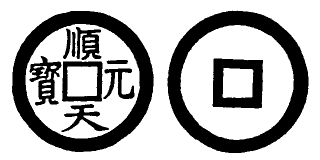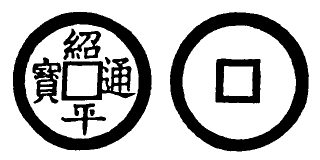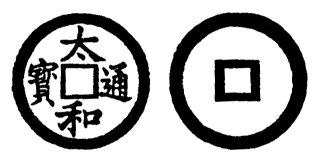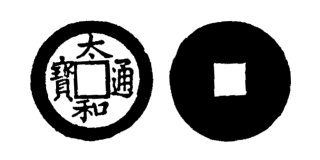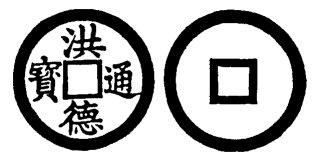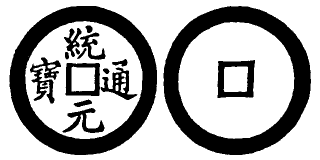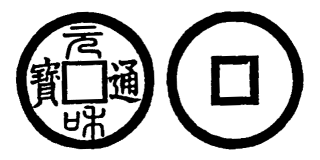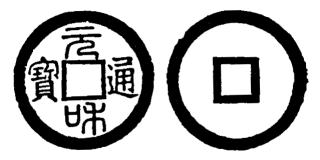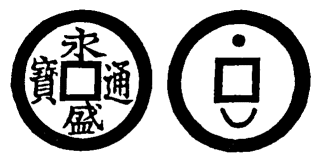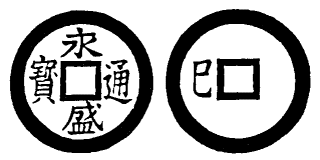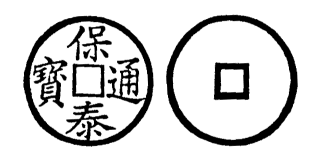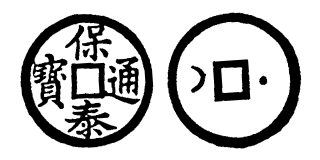Coins and Banknotes of Vietnam
and French Indochina
XVI. The 黎 Le Dynasty. - 1428-1785.
1st King. - 太祖 THAI-TO. 1428-1437. - The successful 黎利 LE-LOI was the leader of the revolt against Chinese rule. He expelled the invading army from the country, and, on the 15th day of the 4th moon of 1428, proclaimed himself king in 河內 Ha-noi, giving rise to the dynasty which governed Annam for a long period. The reign of LE-LOl was comparatively a quiet one, and all his army had to do was to subdue some wild tribes of 太原 Thai-nguyen and 復禮州 Phuc-le-chau. LE-LOI obtained investiture from the Emperor of China, by the payment of 50,000 tads of gold; he devised good administrative laws, which, however, were no sooner published than they were, unfortunately, altogether lost sight of.
No. 51. (Barker: 29.1-29.5)
Obverse: 順天元寶 Thuan-thien-nguyen-bao.
Reverse: plain. Copper coin issued by King 太祖 THAI-TO, founder of the 黎 LE Dynasty.
The political convulsions which disturbed Annam at the beginning of the fifteenth century, prevented the casting of any legal coin by the last seven kings of the 陳 TRAN Dynasty. But from the date of the accession to power of the Le family there was a manifest improvement in the manufacture of coins; excellent metal was used for the casting, and the work is equal to the best specimens of coins circulating in China at that time.
2nd King. - 太宗 THAI-TONG. 1434-1443. The reign of Prince 元龍 NGUYEN-LONG, younger son of LE-LOI, was a peaceful one. Ho contributed materially to the development of the interests of the country, but made several mistakes in his policy, one of the greatest being the sentence of death passed upon General 黎察 LE-SAT, a colleague of LE-LOI. In 1437 he obtained investiture from the Emperor of China, receiving a gold seal in the form of a camel, weighting one hundred taels.
No. 52. (Barker: 30.1-30.16)
Obverse: 紹平通寶 Thieu-binh-thong-bao.
Reverse: plain. Copper coin issued by King 太宗 THAI-TONG during his first nien-hao (1431-1440).
No. 53. (Barker: 31.1-31.7)
Obverse: 大寶通寶 Dai-bao-thong-bao.
Reverse: plain. Copper coin issued by the last named king, during his second nien-hao (1440-1443).
3rd King. - 仁宗 NHON-TONG. 1443-1459. The Prince 邦幾 BANG-KI, son of the last-mentioned king, ascended the throne when he was only two years old. He had some difficulties with China about the kingdom of Ciampa, but these were soon settled by his yielding to the Imperial will, and giving liberty to the king of Ciampa, who had been detained in Annam as a prisoner. In the 10th moon of 1459 BANG-KI was murdered by the followers of his elder brother 宜民 NGHI-DAN, who proclaimed himself king, and reigned during eight months. His name is not included in the list of sovereigns in the Annals, as he was considered a rebel.
No. 54. (Barker: 32.1-32.25)
Obverse: 太和通寶 Thai-hoa-thong-bao.
Reverse: plain.
No. 55. (Barker: see 32.1-32.25)
Same as before, but of diminutive size, and
Reverse: without rim.
Note: Though the reign title was 太和, all coins actually bear the legend 大和通寶 instead of 太和通寶 as it was stated in the original Toda's book.
Copper coins issued by King 仁宗 NHON-TONG during his first nien-hao, (1443-1453). During his reign, Annam was engaged in a long continued war against. the kingdom of Ciampa and the tribes of Phuc-le-chao, Bou-man, Bao-lac, Thanh-da, and An-phu, which caused again a scarcity of copper; and the Queen Regent of the kingdom during the minority of the king had to revert once more to the old system of casting small cash.
No. 56. (Barker: 33.1-33.25)
Obverse: 延寧通寶 Dien-ninh-thong-bao.
Reverse: plain. Copper coin issued by the above king during his second nien-hao (1453-1460).
4th King - 聖宗 THAN-TONG. 1460-1498. Nghi-dan having disappeared, his brother 思誠 TU-THANH, fourth son of THAI-TONG, was proclaimed king. During his reign the kingdom of Ciampa was destroyed, and its territories incorporated with Annam. The Annals are loud in the praise of this king, who evidently raised the country to its highest degree of splendour and wealth
No. 57. (Barker: 35.1-35.12)
Obverse: 光順通寶 Quang-thuan-thong-bao.
Reverse: plain. Copper coin issued by King 聖宗 THANH-TONG during his first nien-hao. (1460-1470).
No. 58. (Barker: 36.1-36.20)
Obverse: 洪德通寶 Hong-duc-thong-bao.
Reverse: plain.
Copper coin issued by Thanh-tong during his second nien-hao (1470-1498) The coins of this king reflect the great prosperity which existed in Annam during that period. The metal is of very good quality, and the casting resembles the K'ai-yuen coins of China.
5th King. - 憲宗 HIEN-TONG 1498-1505.Out of thirty four sons left by the last monarch, the crown passed to the elder, called 鏳 TANG. who devoted himself to the organization of the army, although the kingdom had the good fortune of remaining in a peaceful state during his reign.
No. 59. (Barker: 37.1-37.17)
Obverse: 景統通寶 Canh-thong-thong-bao.
Reverse: plain. Copper coin issued by King 憲宗 HIEN-TONG (1498-1505).
6th King. - 肅宗 TUC-TONG 1505. The Prince 遵 Tuan, third son of the last king, only occupied the throne during six mouths. His history may be briefly summed up by stating that as soon as he had performed the burial rites over the remains of his father, he died himself.
7th King. - 威穆帝 OAI-MUC-DE. 1505-1509. This Prince was the second son of king HIEN-TONG. Proclaimed king by a palace intrigue, he immediately showed his cruel nature by ordering the murder of the Queen Dowager and of the Minister of Rites. During his reign the 莫 MAC family began to assume the first position in the kingdom. The disorderly conduct of this monarch very soon disgusted the mandarins as well as the people; and the army, which then began to be of first importance in the country, revolted under the command of General 黎譓 LE-UINH. The king, being incapable of putting down this rebellion, committed suicide by taking poison, on the 1st day of the 12th moon of 1509.
No. 60. (Barker: 38.1-38.6)
Obverse: 端慶通寶 Thoai-khanh-thong-bao.
Reverse: plain. Copper coin issued by King 威穆帝 Oai-muc-de (1505-1509).
8th King. - 襄翼帝 THUONG-DUC-DE. 1509-1517. During this rebellion General UINH had proclaimed as king of Annam his own brother 宗 TONG, whose history will be found with that of the rebels. When TONG died. UINH seized the throne for himself in the last moon of 1509, taking 洪順 HONG-THUAN for the name of his reign. The example of his revolt and success was contagious, rebels appearing in all the provinces, and in 1511 the king very nearly lost his throne, being saved by the personal valour of General 鄭 TRINH. This king did not attend to the well-being of his people, but devoted himself entirely to his own pleasures. He ordered the construction of boats to be manned by naked women, and invented many other ways of pandering to his lustful desires. To the mild remonstrances made on this subject by General TRINH. the king replied by ordering him to be bambooed. The General revenged himself by rebelling with his troops, and he murdered the king in 1517.
TRINH, being then master of the country, took advantage of this to proclaim as king a boy of eight years called 光治 QUANG-TRI, who reigned only three days, and was later on strangled in the province of 清華 Thanh-hoa.
Another general called 阮 NGUYEN appeared in arms against the General TRINH, and he proclaimed as king the Prince 誼 Y. At that time the rebels had in their power more than half the kingdom, and allusion will subsequently be made to their struggles. Then began the rivalry between the two families of 鄭 TRINH and 阮 NGUYEN. Their power increased to such an extent that they ended by abolishing the royal authority altogether. The NGUYEN family were soon compelled to retire to 廣南 Quang-nam, where they became independent, giving birth to the kingdom of Cochinchina, which two hundred years afterwards conquered Tunquin.
The Trinh, being Lords of the Palace, except on very rare occasions, always lived at the royal court of the LE kings. They were at the head of the army, they appointed successors to the kings, and they governed the country under the veil of a king who was made to disappear when he did not serve the interests of the Lords. This great authority at length became hereditary, and thus called forth another dynasty side by side with the Royal LE.
Another family of successful Generals then appeared on the scene, and ultimately becoming more powerful than the two last-named, drove out the LE Dynasty and usurped the throne. This was the 莫 MAC family, whose real power began in 1508, when one of its members was appointed Commander-in-Chief of the 天武 Thien-vo, the king's guards. The history of this family will be treated in chapter XVIII.
No. 61. (Barker: 39.1-39.22)
Obverse: 洪順通寶 Hong-thuan-thong-bao.
Reverse: plain. Copper coin issued by 襄翼帝 THUONG-DUC-DE (1510-1517).
9th King. - 昭宗 Chieu-tong. 1517-1523. Was the Prince 誼 Y, who practically neither reigned nor governed. He had no personal history, and that of his country is reduced to a record of the contests between the Generals TRINH, NGUYEN, and MAC. The latter had the advantage for a time, and 莫登庸 MAC DANG-DUNG had the good fortune of overcoming not only his rivals, but also the rebels who existed in the provinces. He obtained from the king the appointment as Lieutenant-General of the kingdom, and his power was so great, that the king himself tried to escape from it, and one niglit quietly ran away from the palace to General TRINH'S camp to obtain assistance. MAC at once took advantage of the situation, and after having appointed as king the Prince 春 Xuan, pursued the fugitive monarch as far as the Laos frontier, where he was made a prisoner, kept in captivity for five years, and finally murdered.
No. 62. (Barker: 40.1-40.5)
Obverse: 光紹通寶 Quang-thieu-thong-bao.
Reverse: plain. Copper coin issued by King 昭宗 CHIEU-TONG (1517-1523).
10th King. - 恭皇 CUNG-HOANG. 1523-1527. The Prince 春 XUAN mentioned above was proclaimed king under the name of 統元 THONG-NGUYEN, and led a happy life to the end of his reign. He was relieved of the duties of his position by MAC DANG-DUNG, who enlivened his days with every sort of pleasure up to the 4th moon of 1527, when the king was forced to abdicate in favour of his first general, who lost no time in signing the king's death sentence. Then Mac Dang-dung proclaimed himself king of Annam under the name of 明德 MINH-DUC, and occupied the whole country until 1533, when he had to retire to the North.
No. 63. (Barker: none)
Obverse: 統元通寶 Thong-nguyen-thong-bao.
Reverse: plain. Copper coin issued by King 恭皇 Cung-hoang (1523-1528).
11th King. 莊宗 TRANG-TONG 1533-1549. One son of the Prince 諠 Y, called 寧 NINH, came down from the Ai-lao, where he had taken refuge, in company with General 阮金 NGUYEN-CAM, and with an army of ten thousand followers began the work of reconquering his kingdom from the usurper. His first act was to send an embassy to China to explain to the Emperor 嘉靖 KIA-TSING the political occurrences which had taken place in Annam. In consequence of this, an Imperial Commissioner was appointed in 1536, and supported by a strong army, passed over the frontier from the province of Kuang-si. On the strength of the Commissioner's report to the Emperor, the sovereignty over Cochinchina was given to the descendant of the LE family, and Tunquin was left to be occupied by the MACS. But Prince Ninh, who reigned under the name of 元和 NGUYEN-HOA, continued the war against the Macs, taking from them the provinces of 清華 Thanh-hoa and 山南 Son-nam.
No. 64. (Barker: 58.1-58.2)
Obverse: 元和通寶 Nguyen-hoa-thong-bao. The two first characters are written in the seal style.
Reverse: plain.
No. 65. (Barker: 58.1-58.2)
Same as before, but with the characters 通寶 Thong-bao written in a different style. Copper coins issued by King 莊宗 TRANG-TONG (1533-1549).
12th King. - 中宗 TRUNG-TONG. 1549-1557. During this reign began the supremacy of the TRINH family, to whom all the Le kings were soon subordinate. General 阮金 NGUYEN-CAM the restorer of the Le, had died of poison, and as his two sons were still of tender years, his position was occupied by General 鄭檢 TRINH-KIEM. The whole of this reign was passed by this general in making war against the Macs, and fearing the power that might be exercised by the two sons of Nguyen-cam on arriving at majority, he made them feudal lords of the provinces of 順化 Thuan-hoa and 廣南 Quang-nam then occupied by the Macs. The history of the principality thus formed, and from the rulers of which the present dynasty descended, will be found in chapter XIX.
13th King. - 英宗 ANH-TONG. 1557-1572. TRINH-KIEM followed up the war against the Macs, and with an army of fitly thousand men entered the province of 山南 Son-nam where he was defeated. He soon, however, got men together again, and in 1560 reached the neighbourhood of Ha-noi, the capital of the Macs. In 1569 He transferred his power to his son 鄭從 TRINH-TONG, who was unable to occupy his position until he had fought against one of his brothers. He continued the war against the Macs in the province of Thanh-hoa, and for the first time, in 1572, sent the royal troops to fight against the NGUYEN in the Quang-nam; but they were defeated.
Tlie power and authority of Trinh-tong in the palace were so great that the king was practically put aside. Desirous of ending this thraldom. Anh-tong ran away secretly to the province of 爻安 Nghe-an. TRINH-TONG acted as the Macs had done previously; he appointed another king and went to Nghe-an where he made Anh-tong prisoner, and murdered him.
14th King - 世宗 THE-TONG. l572-l599. This king, who was proclaimed by TRINH-TONG, was naturally under his tutelage. The wars against the Macs went on, the king sometimes having to protect his territories against their invasions, and at other times invading Tunquin from the provinces of 寧平 Ninh-binh, 南定 Nam-dinh, and 興化 Hung-hoa.
TRINH-TONG's good fortune carried him as far as the walls of Hanoi, which capital he took by storm in 1592, burning and destroying it, and capturing MAU-HIEI, the Mac king. The same fate befell MAC TUYEN and MAC KINH-CHI, and after some diplomatic negotiations with the Emperor of China, Thrinh-tong was allowed to exercise royal authority over the new provinces conquered from the Macs, who had only one small state left on the frontier. Then (1599) Trinh-tong was appointed 平安王 Binh-an-vuong. or Peaceful Prince. The king being sick he nominated his successor to the throne.
15th King. - 敬宗 KINH-TONG. 1599-1619. He was made king by the will of his father, but by the authority of Trinh-tong. This powerful Lord had to quell several military rebellions, and at one. time he was very seriously menaced by a conspiracy in which one of his own sons and the king had taken part. The conspiracy was discovered in time, and Trinh-tong, having made the king prisoner, hanged him in his own palace.
16th King. - 神宗 THAN-TONG. 1619-1642. This king was also nominated by TRINH-TONG, who was now growing old and feeble. He tried to secure the succession to his power by dividing it between his two sons, in order to avoid dissensions. But jealousy broke out in his family even before his death, as not only both his sons but also one of his brothers tried to scrure his power. Trinh-tong; was taken ill to his brother's house and there his younger son was murdered. The elder, called 鄭莊 TRINH-TRANG, hearing of this, ran away to the province of Thanh-hoa, taking with him the king and the royal family. Trinh-tong was then driven away from his brother's place, and abandoned by the servants who had carried him away in a sedan chair, died alone on the road. So ended the statesman who had more capitcity and energy than any other man mentioned in the whole of Annamese history, and who for the prosperity of the kingdom, as well as for his own protection, severed the heads of five kings and gave to the old LE dynasty a territory to govern.
TRINH-TRANG succeeded his father on the throne, and seing the power of the Macs reduced to the small state of Cao-bang, directed his activity to subdue the Nguyen; but the royal armies were repulsed in every expedition they made against the Quang-nam. In 1642 King THAN-TONG abdicated in favour of his sun 袥 HUU.
17th King. - 真宗 CHON-TONG. 1642-1648. Nothing worthy of notice occurred during his reign, except an expedition against the Quang-nam principality, where the Le troops again had to take to flight. The king died in 1648, and his father Than-tong ascended the throne for the second time. 神宗 THAN-TONG (2nd time) 1648-1662. TRINH-TRANG was attacked in 1653 by the NGUYEN armies, which took possession of the province of 爻安 Nghe-an, after having annihilated the royal troop sent against them. He died of grief in 1654 and was succeeded by his son 鄭碩 TRINH-THAC, who at once despatched an army against the Nguyen, but was likewise defeated. In 1662 the king died.
No. 66. (Barker: 60.1-60.31)
Obverse: 永壽通寶 Vinh-tho-thong-bao.
Reverse: plain.
No. 67. (Barker: see 60.32-60.45)
Same as before, but with the characters of tho obverse written in the running hand style.
Copper coins issued by King 神宗 THAN-TONG during his third nien-hao (1655-1661). On account of the great disorder prevailing in the kingdom at that time, there is no record of any coins having been cast from the middle of the sixteenth century until 1675, with the exception of the ones just referred to.
18th King. - 玄宗 HUYEN-TONG. 1662-1673. During his reign foreigners were forbidden to live in Annam, either for purposes of trade or religion. The king had still less power, if possible, than his predecessors, as Trinh-thac claimed the right of writing to and saluting him on equal terms, and of taking a seat on his left side at official receptions. In 1667 the Macs were finally driven away from Cao-bang.
19th King. - 嘉宗 GIA-TONG. 1672-1675. During his reign Trinh-thac organized a formidable expedition against the Quang-nam principality, where he made war for seven months. But unable to obtain possession of the citadel of 陳寧 Tran-ninh, which he had besieged, and his army suffering; great losses, he retired again to Tunquin.
20th King. - 熙宗 HI-TONG. 1675-1705. He was a brother of the last king, and his reign was a more peaceful one than that of many of the former kingd, as all he did was to quell some small rebellions and to fight against an invasion made from China by the Macs in 1677.
In 1683 TRINH-THAC died, leaving his position to his son 鄭干 TRINH-CAN, who was able to devote himself to the organization of public affairs in Tunquin and made several good laws, one of them forbidding gambling, for instance.
No. 68. (Barker: 62.1-62.3)
Obverse: 永治通寶 Vinh-tri-thong-bao.
Reverse: plain.
No. 69. (Barker: 63.1-63.4)
Same as before but having on the obverse the character 元 nguyen instead of 通 thong, and the characters 治元 tri-nguyen written in the seal style. Copper coins issued by King 熙宗 HI-TONG during his first nien-hao (1675-1689).
No. 70. (Barker: see 65.1-65.2)
Obverse: 正和通寶 Chanh-hoa-thong-bao
Reverse: plain. Copper coin issued by the former king during his second nien-hao (1689-1705).
21st King. - 裕宗 DU-TONG. 1705-1727. He was the son of the last king, who was forced to abdicate by Trinh-can. But this Lord had but little time to use this new and serviceable instrument, as he died in 1708 leaving his authority to his son 鄭矜 TRINH-CANG. The latter passed many good laws, some of them relating to mining and coinage, of which mention has already been made. He persecuted the Christian missionaries without mercy, and in 1723 passed sentence of death upon one European, which sentence was duly carried out. In 1727 he forced the king to abdicate in favour of one of his sons, but some time afterwards both the king and himself died within a short space of time of each other.
No. 71. (Barker: 66.1)
Obverse: 永盛通寶 Vinh-thinh-thong-bao.
Reverse: plain.
No. 72. (Barker: none)
Obverse: Same as before.
Reverse: A dot representing the sun above the hole, and the moon below.
No. 73. (Barker: 66.2)
Obverse: Same as before.
Reverse: The cycle character 巳 ti on the left of the hole, probably meaning that the cash was ordered to be cast during a fourth moon. Coins issued by King 裕宗 DU-TONG during his first nien-hao (1705-1719).
No. 74. (Barker: 67.1-67.4)
Obverse: 保泰通寶 Bao-thai-thong-bao.
Reverse: plain, with a narrow rim.
No. 75. (Barker: 67.5)
Obverse: Same as before.
Reverse: The sun and moon on the riglit and left sides of the hole. Red copper coins issued by the last-named king during his second nien-hao (1705-1719).
There is now an interruption of twenty years in the casting of cash till the coming to power of King 顯宗 HIEN-TONG. For some years, in consequence of disastrous inundations, there was a remission of taxation on the Annamese, the loss to the revenue caused thereby being made good by increased taxation on the Chinese. In 1737 the treasury became so empty that to fill it the officials put up honorary titles for public sale. A mandarin could gain a step in rank by the payment of six hundred strings of cash, and the commonest man in the kingdom was able to obtain the highest rank by the payment of two thousand eight hundred strings.
22nd King. - 永慶帝 VINH-KHANH-DE. 1727-1731. The new Lord, son of TRINH-CANG, and called 鄭江 TRINH-GIANG, was very active, and took great pains for the good administration of the country. But like his predecessors, he wanted to govern as an absolute ruler, and not finding VINH-KHANH so serviceable as he desired, he degraded and imprisoned him in a fortress, where he was murdered four years afterwards.
23rd King. - 純宗 THUAN-TONG. 1731-1735. During his short reign no important, event took place, with the exception of the printing of Annamese official books by order of the Government.
24th King. - 懿宗 Y-TONG. 1735-1740. Trinh-giang was still the absolute master of the government, but the extent of his authority was the cause of his ruin. He indulged in every kind of vice, and to obtain money for his pleasures put the public offices up for sale. He obtained from the Emperor of China the title of 安南上王 An-nam-thuong-vuong, or Supreme King of Annum, and this was the signal for the rushing to arms of the adherents of the LE Dynasty. It was then seen that the real king of Annam had no power as compared with the TRINH Lords. Rebels appeared in every part of the kingdom, and to hasten the destruction of the Trinh family, its representative GIANG handed over his power to a favorite eunuch. He was relieved of it in 1739, and 鄭營 TRIN-DINH took his place. In the following year the king abdicated.
